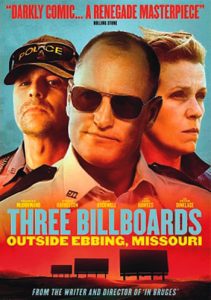Praying with the Movies – Three Billboards outside Ebbing Missouri

Fr Brian Cummings SM
Directed by Martin McDonagh
Find the Key to the Human Heart
The poet William Blake (1770-1820) wrote "We see through our eyes, not with our eyes. We see with our vision - the power of our imagination."
Blake could not have had the films of Director Martin McDonagh in mind when he wrote those words, but they are certainly apposite to McDonagh's most recent movie, Three Billboards Outside Ebbing, Missouri.
 The movie centres on Mildred Hayes' (Frances McDormand) quest for justice after the rape and murder of her daughter less than a year earlier. Outraged by the lack of progress in apprehending the killer, Mildred decides on a very public shaming by challenging the local police, in particular, the Sheriff, Bill Willoughby (Woody Harrelson). She rents space on three derelict billboards just outside the town of Ebbing and puts up her messages: "Raped While Dying," and "Still No Arrests?" and "How Come, Chief Willoughby?" Willoughby, while not happy with the public attack on him, copes much better with it than his volatile deputy, Officer Jason Dixon (Sam Rockwell), whose active involvement in responding to Mildred's challenge escalates rapidly.
The movie centres on Mildred Hayes' (Frances McDormand) quest for justice after the rape and murder of her daughter less than a year earlier. Outraged by the lack of progress in apprehending the killer, Mildred decides on a very public shaming by challenging the local police, in particular, the Sheriff, Bill Willoughby (Woody Harrelson). She rents space on three derelict billboards just outside the town of Ebbing and puts up her messages: "Raped While Dying," and "Still No Arrests?" and "How Come, Chief Willoughby?" Willoughby, while not happy with the public attack on him, copes much better with it than his volatile deputy, Officer Jason Dixon (Sam Rockwell), whose active involvement in responding to Mildred's challenge escalates rapidly.
McDormand won this year's Oscar for Best Actress, and it is easy to see why. Mildred Hayes is a complex character to bring to life, and McDormand gives a stunning performance, revealing the rage, the pain, the scorn of a woman who mourns the rape and murder of her daughter and yet can find no justice.
Almost as impressive is the performance of Woody Harrelson as Chief Bill Willoughby, the main target of Mildred's rage and frustration. A man popular within the local community and one who is dying of cancer, he appears to have done everything that could reasonably be expected in his hunt for the perpetrator. Understandably, he is not happy with the billboards displaying a most public attack upon his character and competency, and, yet, he is not insensitive to Mildred's pain.
The third major character, in what is overall an outstanding cast, is Officer Jason Dixon, played by Sam Rockwell. Both racist and violent, Dixon is not only insensitive to Mildred's pain but threatened by it. He is, all things considered, a thoroughly dislikeable and unsympathetic character who manages to offend every other character in the film and, presumably, everyone in the audience.
Three Billboards was nominated for Best Picture by the Academy, and it would have been a worthy winner. But ‘Best Picture’ covers a broad sweep, so we have to ask: just what category of film does Three Billboards fit into?
It is certainly a crime story. It is also clearly a drama. And there are large elements of black humour evident.
It doesn't neatly fit into any one category, nor does director McDonagh want it to. He does not do straightforward interpretations or black-and-white views of the world. For him, and consequently for his audience, there is work to be done in coming to a personal interpretation of Three Billboards. In other words, as Blake urges us, "to see through our eyes."
So, as the movie progresses, we are called to go beyond our initial impressions.
Mildred is never really presented as likeable, but she is certainly sympathetic. Throughout the film she remains a character we can relate to because of what has happened to her daughter. But in the course of nearly two hours, other questions about her begin to surface. Have her demands for justice morphed into a desire for vengeance at all costs? Has she lost the ability to see good in anyone, or certainly in any man? Has the fire she has lit by erecting the three billboards blown back on her, and is it now consuming her?
The main target of the billboard messages is Chief Willoughby, someone Mildred believes has let her and her daughter down. Yet almost everything good that happens in and around Ebbing seems to include Willoughby, and in the course of the movie his integrity clearly emerges as he searches for justice rather than for vengeance.
The biggest transformation comes with Officer Dixon. Three Billboards does make clear that Dixon hasn't achieved his generally repulsive nature by himself and unaided. His mother, a singularly unlovable individual in her own right, has been anything but a positive influence on his life and continues to ridicule and degrade him at every opportunity. Nevertheless, the movie does not excuse Dixon from personal responsibility for his racism and violence.
The only person in Ebbing who seems to see anything good in Officer Dixon is Sheriff Willoughby, who tells him in a letter that ‘deep down’ he is a good man. The reasons behind that evaluation, however, are never made clear to the audience.
By the end of the film, Willoughby is dead, and Mildred and Dixon have formed a kind of alliance to kill a perceived rapist (not the one who killed Mildred's daughter, but still someone in their minds who deserves to die). Whether or not they follow through on their plan is not clear as the movie ends. Neither are a number of other things.
As we've seen, this is how director McDonagh wants it to be. Some would see what happens to Officer Dixon as a kind of redemption. Others would say it is much more a matter of damnation. Our views of Mildred have been changed in the course of the movie – not entirely, but certainly subtly. The seemingly most balanced and ‘good’ individual in the story, Sherriff Willoughby, has committed suicide in the face of terminal cancer.
Do we emerge from Three Billboards depressed and buffeted by the rage and violence, or uplifted, drained and entertained? Or perhaps elements of all these in varying degrees? McDonagh would say that that is for us to work through.
To esteem the heart is the way to change people
One way we as Marists can approach Three Billboards is in the light of one of Marist Founder Jean-Claude Colin's admonitions to the early Marists in the remote Bugey mountain regions of France: Have a great knowledge of the human heart and find the key to the human heart. You must win people's esteem, and their heart, in order to win them over.
To esteem the heart is the way to change people rather than pursuing a purely intellectual approach. In the film we see that with Willoughby's positive assessment of Dixon. We also see it when the local priest visits Mildred to suggest that she take down the billboards because, after all, Chief Willoughby didn't commit the crime personally. Her response is withering, not just about guilt and innocence, but also about the pain of a wounded heart.
Three Billboards is a movie that warrants significant reflection. The key to relating to the characters, to seeing insights in how and why they act and react as they do, is to look, following Fr Colin's words, into their hearts. Such insights will not make them more likeable or their actions more excusable, but they will help us to see the person below the surface.
Nor will Fr Colin's insights enable us to give our own neat conclusion to the movie. There is no ‘satisfying end’ to Three Billboards, just as there often isn't in real life when it comes to wounded, hurting people.
Fr Colin does not call us as Marists to ‘solve’ people's problems. He calls us to relate to them at the level of the heart and to enter into the mystery of their lives. From there, anything may be possible.
 Entries(RSS)
Entries(RSS)